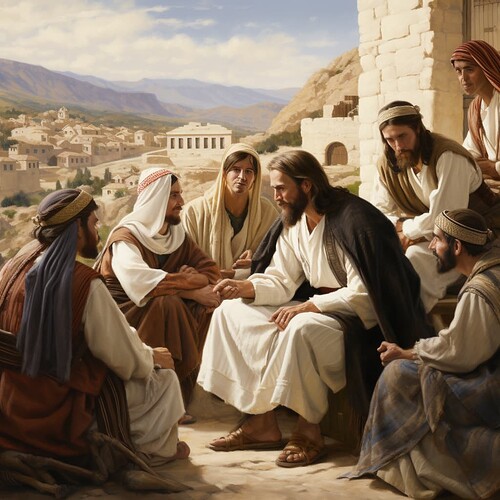![]() January 17: Matthew 19 - The Teachings of Jesus on Marriage, Wealth, and Humility
January 17: Matthew 19 - The Teachings of Jesus on Marriage, Wealth, and Humility
Navigating Life’s Challenges with Christ’s Wisdom
 Introduction
Introduction
On January 17th, our journey takes us to Matthew 19, where Jesus addresses some of life’s most challenging issues: marriage, wealth, and humility. In this chapter, Christ’s teachings offer profound insights into how we should approach these aspects of our lives.
 Matthew 19: Marriage and Divorce
Matthew 19: Marriage and Divorce
Jesus begins by addressing questions about marriage and divorce. He emphasizes the sanctity of marriage, rooted in God’s original design, and addresses the hardness of human hearts that leads to divorce.
Key Verse: “What God has joined together, let no one separate.” — Matthew 19:6
 The Rich Young Man
The Rich Young Man
Matthew 19 also tells the story of the rich young man who sought eternal life. Jesus’ response to him challenges our understanding of wealth and discipleship, pointing us towards a life of selflessness and spiritual priorities.
Key Verse: “It is easier for a camel to go through the eye of a needle than for someone who is rich to enter the kingdom of God.” — Matthew 19:24
 Key Themes and Reflections:
Key Themes and Reflections:
The Sanctity of Marriage: Jesus teaches that marriage is a sacred union, intended to be lifelong and rooted in God’s design.
The Danger of Wealth: The encounter with the rich young man serves as a warning about the spiritual dangers of wealth and the need for total reliance on God.
Humility and the Kingdom of Heaven: Christ emphasizes the importance of humility and childlike faith as prerequisites for entering the kingdom of heaven.
 Today’s Application:
Today’s Application:
Reflect on your approach to marriage and relationships. Are they aligned with Christ’s teachings? Consider how you view and handle wealth. Does it draw you closer to or further from God? Embrace a spirit of humility in your faith journey.
 Hidden Gem:
Hidden Gem:
Did you know? The phrase “eye of a needle” used by Jesus was a metaphor to illustrate the difficulty for the wealthy to enter God’s Kingdom, emphasizing the need for God’s grace in all aspects of salvation.
 Reflective Q&A:
Reflective Q&A:
![]() Matthew 19: Marriage, Wealth, and Humility
Matthew 19: Marriage, Wealth, and Humility
![]() Living Out Christ’s Teachings on Marriage: How can Jesus’ teachings in Matthew 19 shape our understanding and practice of marriage?
Living Out Christ’s Teachings on Marriage: How can Jesus’ teachings in Matthew 19 shape our understanding and practice of marriage?
A: Jesus’ emphasis on the sanctity and permanence of marriage calls us to view our relationships through the lens of commitment, love, and God’s original design for unity.
![]() Balancing Wealth and Spiritual Priorities: How can we balance the pursuit of wealth with our spiritual priorities?
Balancing Wealth and Spiritual Priorities: How can we balance the pursuit of wealth with our spiritual priorities?
A: Matthew 19 encourages us to hold wealth loosely, prioritize spiritual growth, and use our resources to serve God and others, rather than accumulating riches for selfish purposes.
 Join the Discussion:
Join the Discussion:
How does Matthew 19 influence your perspectives on marriage, wealth, and humility? Share your insights and reflections in the comments below.
#Marriage #Wealth #Humility #JesusTeachings #BibleStudy #SpiritualGrowth
![]() Continue Exploring Matthew: Join us as we delve deeper into the teachings of Jesus and discover how they apply to our lives today.
Continue Exploring Matthew: Join us as we delve deeper into the teachings of Jesus and discover how they apply to our lives today.
 Join the forum!
Join the forum!
Engage with our AIgniteScripture Community for deeper insights:
Free Members: Participate in discussions and access biblical resources. Join here: 🌟 How to Join Page - Membership Options
Supporters Membership ($20/month or $200/year): Enjoy personalized newsletters, exclusive forum access, and more. Join as a Supporter: 🌟 How to Join Page - Membership Options
![]() Stay Updated with our AIgniteScripture Newsletter: Get daily readings and insights. Subscribe here: https://newsletter.aignitescripture.com/
Stay Updated with our AIgniteScripture Newsletter: Get daily readings and insights. Subscribe here: https://newsletter.aignitescripture.com/
